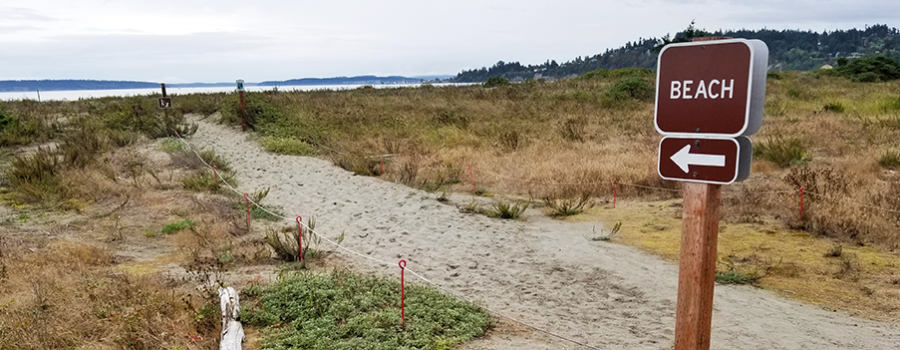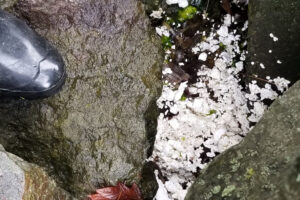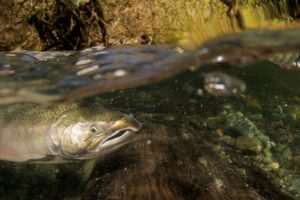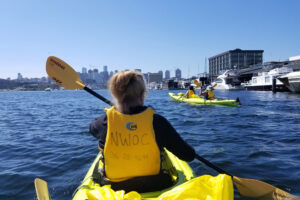I look forward to the day when we don’t have to say “Leave nothing behind but your footprints”. At some point, corporations will stop selling us plastic packaging and people will clean up after themselves. Until then, we need focused efforts such as International Coastal Cleanup (ICC) day. On Saturday, September 19th, volunteers in more than 100 countries cleaned up the shorelines and waterways they love.
Unfortunately, most of the debris we picked up will end up in landfills instead of being recycled. Recent reports from NPR and Greenpeace describe recycling in the US as an illusion. Most of the materials we sort, clean, and place in our blue recycling bins end up buried, not recycled. Even so, in a landfill is better than on a beach, even if it doesn’t always stay there. According to the World Economic Forum, “as much as 30% of plastic leaks out of the collection system and is unaccounted for, which means it’s scattered in your local waterway or in the ocean.”1 It might only be a matter of time before it finds its way downhill to the beach again.
Setting that depressing reality aside for the day, I combined ICC day with a road trip to explore the northeast corner of the Olympic Peninsula. I picked three spots on the map – Port Gamble, and the State Parks at Fort Flagler and Fort Worden. These spots are both gathering places for people and are on the shorelines of two major channels within Puget Sound.

First stop, Port Gamble
Originally home to the S’Klallam nation, the town of Port Gamble was established in 1853 at the entrance to the Hood Canal. It is one of the best-preserved lumber towns in the western US. It’s obvious that the community takes excellent care of the town’s historic buildings. In contrast, is the breakwater that protects the north shore of the town. At least one person seems to treat it as a dump. I found this to be odd given there was a lineup of five Waste Management dumpsters located within a stone’s throw on the other side of the parking lot.

Heavyweight plastic sheeting, which had secured a load of bricks to a pallet at some point, was strewn across the breakwater. It was enough to fill two 13-gallon garbage bags. Exposure to the sun made the plastic brittle enough to break into hundreds of much smaller pieces that I could not recover. This is what plastic does. It breaks up, not down. It breaks into smaller and smaller pieces until animals mistake it for food and it enters our food web.
New Scientist Magazine produced the following video showing microscopic plankton at the base of our food web eating plastic:
Ingesting plastic can cause several problems. Most obviously, it may block the digestive tract. Beyond that, it may poison the animal that ate it. The chemical compounds that are plastic often bind with toxic chemicals such as those from our stormwater runoff. That turns plastic into a delivery vehicle for toxins throughout the food web. Not only does that put plankton, fish, and marine mammals at risk, it puts us at risk too. For an overview of how toxins threaten all levels of the food web, read the blog called “Welcome baby orca J57!”.
Next stop, Fort Flagler and Fort Worden State Parks
These two State Parks used to be military installations that protected Admiralty Inlet during WWI and WWII. With the exception of a 1-liter Dr. Pepper bottle and a couple for Frito’s bags (thanks to Keurig Dr. Pepper, Inc. and PepsiCo, Inc. for the plastic), the beaches were generally clear of large pieces of debris. That said, there was still a problem. Scattered throughout the rocks that form the high tide mark on the beach were lots of small pieces of plastic.

The cigarette butt, water bottle top, foam earplug, and what looked like a cap for a hypodermic syringe were all likely discarded on this beach. There were also a number of unrecognizable pieces. They had been in the environment long enough for the sun and surf to degrade them. These probably flowed into the Salish Sea elsewhere and then washed up on these beaches. These brightly colored pieces already look like food to marine birds. Left uncollected, or uneaten, they will continue to break up into smaller pieces until small fish and even smaller plankton mistake them for food too.
Reporting the day’s haul
Cleaning up beaches is a bit like standing at the mouth of a river and yelling “STOP!” It won’t stop the relentless flow. We can clean up the debris, but it just keeps coming. We need corporations to sell us products packaged in something other than plastic. If corporations can innovate alternative packaging models, and if we do a better job leaving nothing behind but our footprints, we have a chance to clean up the incredible mess we have made.
The Ocean Conservancy has an app called Clean Swell that you can use to record how much trash you collect and add it to the global count. My haul for the day was 2 x 13-gallon garbage bags + 2 shopping bags = about 13 pounds.

Tips for You!
- If you want to join the cleanup, bring a bag and don’t forget a pair of gloves! It is garbage, after all. 🙂
- Be safe. Don’t pick up anything that makes you uncomfortable. If you find hypodermic needles or any other dangerous objects, it is up to you to decide if you want to pick them up. If you do, please be exceedingly careful – use a trash picker/grabber so you don’t have to touch them and a sharps disposal container to isolate them.
- Share pictures of what you collect on Instagram, tag @PugetSoundkeeper with the hashtags #PSKVirtualCleanup #CleanOn.
Go Deeper!
Go Deeper to explore the ocean and the Salish Sea through a curated list of articles, books, films, and other resources.
To learn more about the topic in this article, check out the following resources:
- World Economic Forum. The New Plastics Economy: Rethinking the future of plastics
- PBS. The Plastic Problem
- Greenpeace. Deception by the Numbers
End Notes
1 Tenenbaum, Laura. “These Three Plastic Recycling Myths Will Blow Your Mind.” Forbes, Forbes Magazine, 15 May 2019, www.forbes.com/sites/lauratenenbaum/2019/05/15/these-three-plastic-recycling-myths-will-blow-your-mind/.






Leave a Reply
Your comments are welcome.